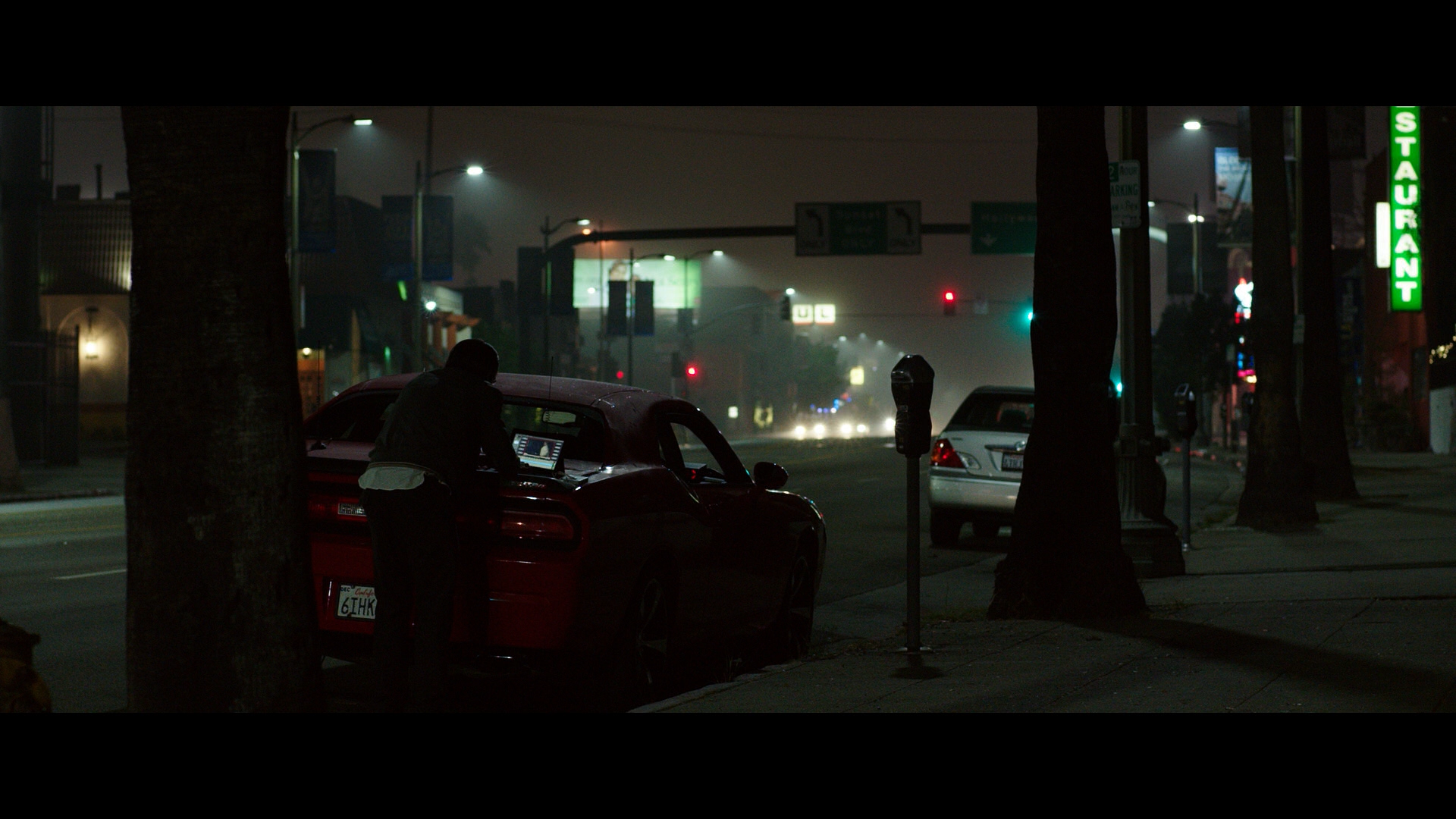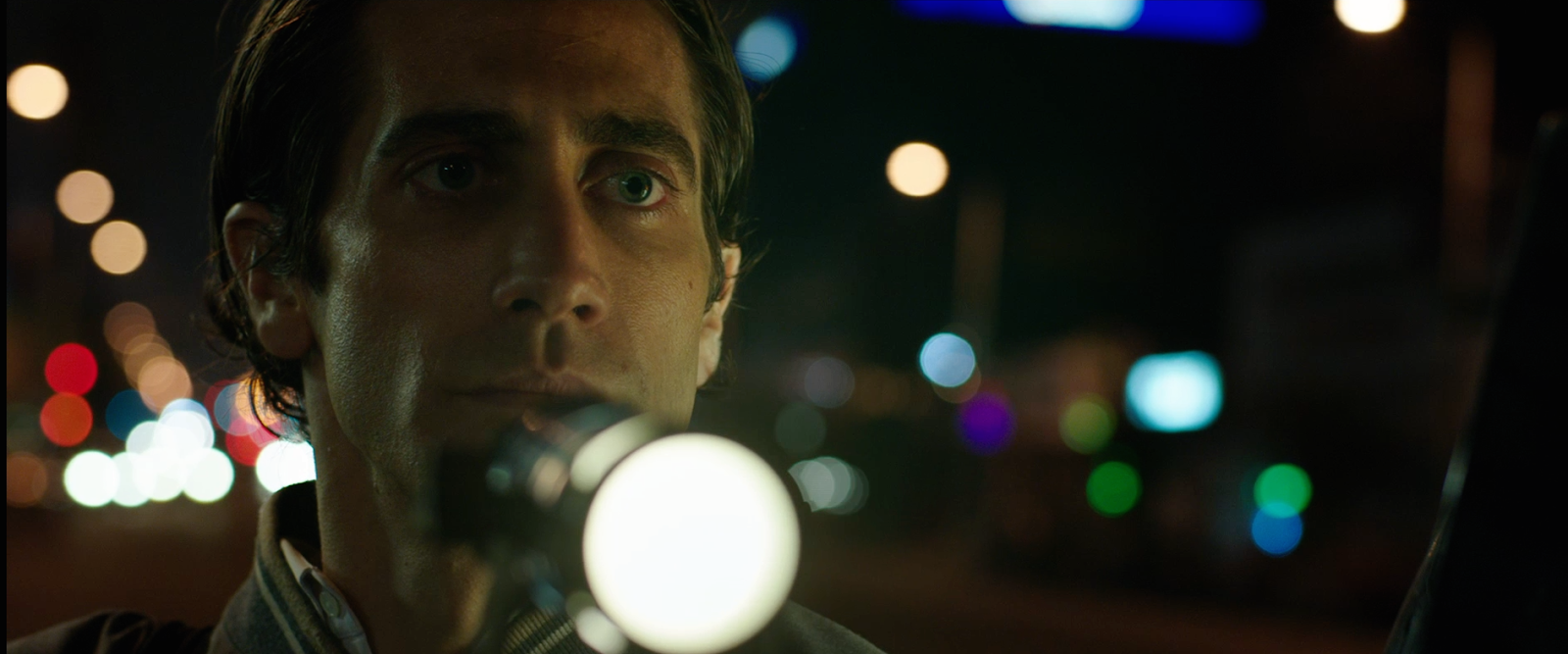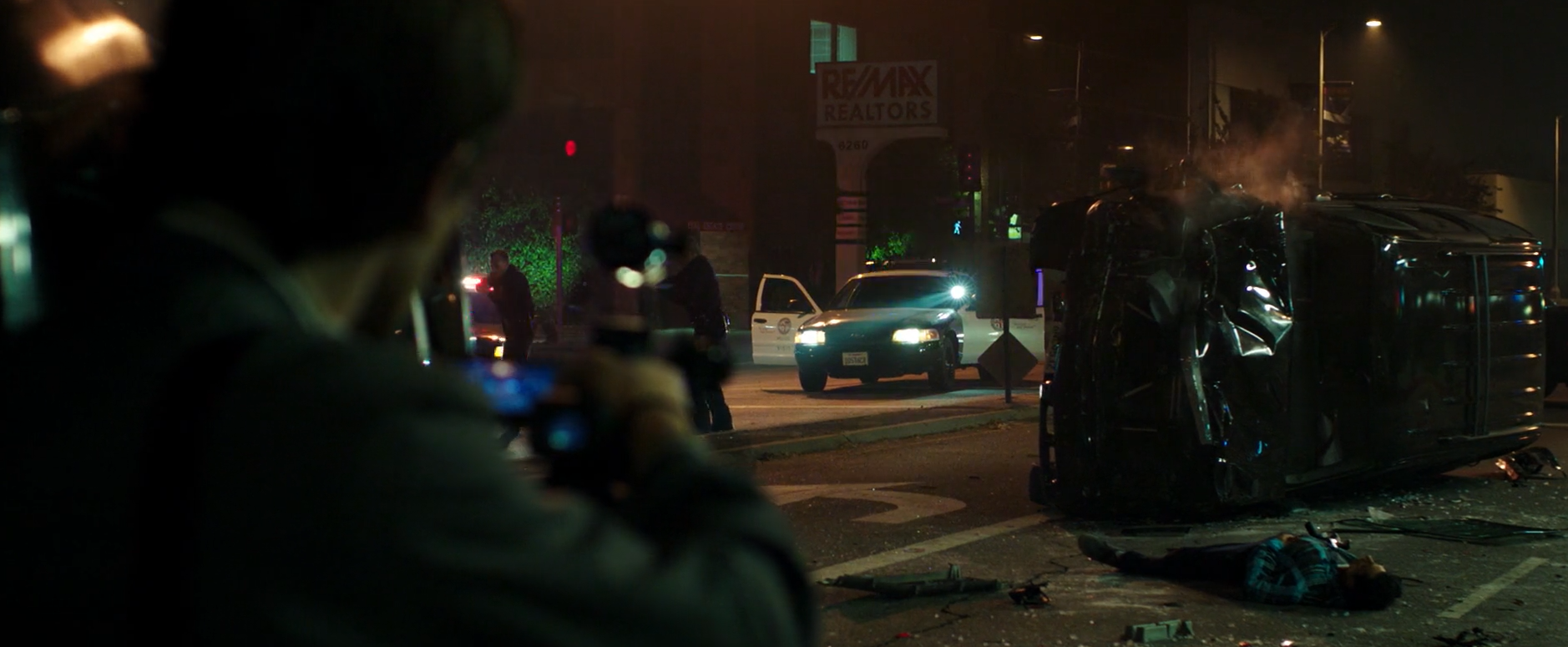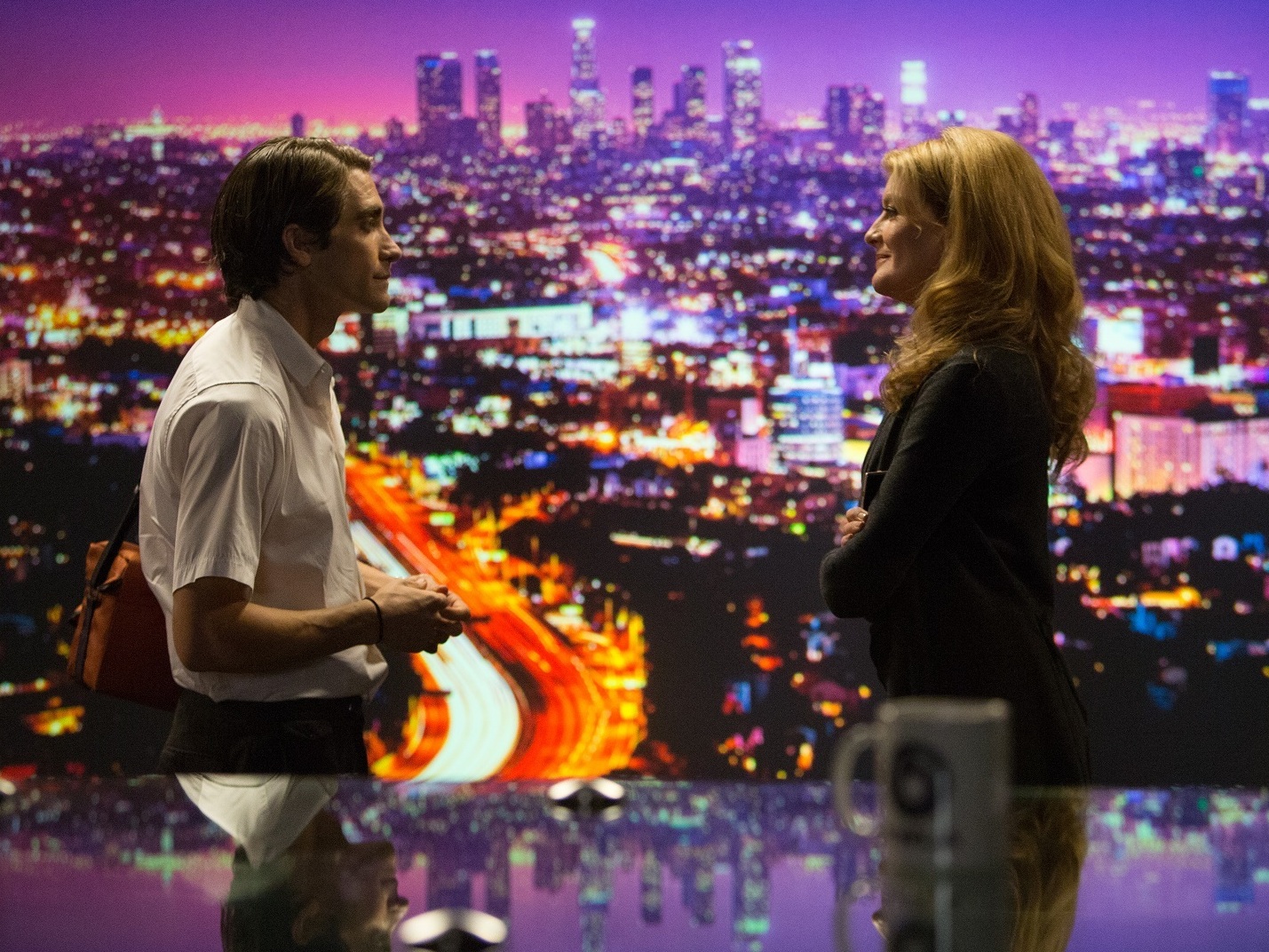In the 1930s, an American reporter took pictures of crime scenes and accidents and sold them to the local press. Arthur Fellig will be the first to use a police radio scanner in his car.
Director Dan Gilroy's first source of inspiration for Night Call, he changed his mind when he learned of Howard Franklin's film The Public Eye , directly inspired by the photographer's life. The filmmaker will return to his idea when he arrives in Los Angeles, learning of the existence of nightcrawlers. Image reporters who could be defined by their independence and their almost exclusively nocturnal activity in order to find the best images of accidents or crime scenes for the local media. Night Call has been available on Amazon Prime Video since the first of March.
Another city of angels
 For his first film, the filmmaker paints a portrait of a nightcrawler ready to do anything to succeed in his field. Hagging, at first glance, all the traits of a sociopath being almost an animal being, Louis Bloom played by Jake Gyllenhaal, impresses with the complexity of his personality, at once atypical, fascinating and scary. The idea was clear for Dan Gilroy, to cling to a realistic, quasi-documentary dimension, as the investigative reporter begins a completely different way of practicing his profession: that of reworking crime scenes as a real doer or even being at the direct source. By immersing us in a completely different facet of Los Angeles, on the edge of the night, the author-director presents us with a little-known universe where often invisible individuals develop a completely different energy rub shoulders. In this obscure Los Angeles, a universe particularly interests us here, that of local media in search of spectacular and voyeuristic information. A space in which the character will first excel by his qualities intrinsic to his personality: discreet, unsympathetic and hard worker. Then, more generally, by the idea that an individual can, thanks to media excesses, his efficiency and his great attention to detail, triumph professionally, developing an extreme rationality defying all morality and ethics. Louis Bloom being an absurd and hard-line reflection of his profession and more generally, of the liberalism of American society.
For his first film, the filmmaker paints a portrait of a nightcrawler ready to do anything to succeed in his field. Hagging, at first glance, all the traits of a sociopath being almost an animal being, Louis Bloom played by Jake Gyllenhaal, impresses with the complexity of his personality, at once atypical, fascinating and scary. The idea was clear for Dan Gilroy, to cling to a realistic, quasi-documentary dimension, as the investigative reporter begins a completely different way of practicing his profession: that of reworking crime scenes as a real doer or even being at the direct source. By immersing us in a completely different facet of Los Angeles, on the edge of the night, the author-director presents us with a little-known universe where often invisible individuals develop a completely different energy rub shoulders. In this obscure Los Angeles, a universe particularly interests us here, that of local media in search of spectacular and voyeuristic information. A space in which the character will first excel by his qualities intrinsic to his personality: discreet, unsympathetic and hard worker. Then, more generally, by the idea that an individual can, thanks to media excesses, his efficiency and his great attention to detail, triumph professionally, developing an extreme rationality defying all morality and ethics. Louis Bloom being an absurd and hard-line reflection of his profession and more generally, of the liberalism of American society.
Louis Bloom, cold and throbbing success story

As Dan Gilroy told independent media outlet ScreenSlam : " We decided early on that we didn't want to make moral judgments about the character or anything in the film. We wanted individuals to make their own decisions. »
Night Call surprises more by the way of its intentions than that of its subject. Beyond a simple formality of point of view, this intention to also make the filmmaker's gaze disappear and to invite the spectator to a total immersion allows the character of Louis Bloom to crystallize a complexity rarely seen in cinema. A complexity at the service of a success story that repels and attracts, which makes us discreetly complicit in immoral media and the creation of an implacable being, in the service of blind logic. The director himself confessed to having wanted to film his protagonist in the manner of a wildlife documentary, letting himself be guided and subject to his own rules and methodical adaptation.
It is this adaptation, furtive and unrestricted, that will define Lou 's journey in his narrative universe. Whether first of all by the many job interviews he will conduct, being at the bottom of the social ladder and ordinary con man, advocating the myth of the American self-made man, hard work and absolute loyalty. It is only by total chance that he then finds himself facing a road accident marking his meeting with a film crew filming the aftermath of the tragedy. The next day, quickly obtaining a camera and a radio scanner, his first confrontations with the profession are bitter failures. Yet, embracing relentless rhetoric and deifying the American dream, he became the figurehead of a struggling local television station. Being ready for anything, seeing a potential and grace in the troubles of Louis Bloom, making him efficient and inventive, the managers of the channel will then teach him the execrable but legal workings of the profession.

In total commitment and unfailing integrity to his own success, the protagonist will then use his partners, including hiring a young vagabond promising him the same fate. In reality, Lou will lie to him shamelessly, posing as a business leader, and manipulating him until his last breath, filming him in agony under the pretext of a brawl he had created himself. Unclassifiable, the character will become an avatar, as the outcome progresses, an extreme and chilling ascent. Accompanied by a playful and infinitely ironic musical theme, Louis Bloom will congratulate his new employees in the final moments of the film, slipping them a final line after a speech on the merit and importance of a careerist life, catalyzing all the sickly fervor of an elusive loner: " I will never ask you to do something I would not do myself. »
Nightcrawlers at the service of the information industry
 Multiplied tenfold through this immersion in the skin of Louis Bloom, the underlying criticism of the news industry remains an important intention in Night Call. In reality, Dan Gilroy, anxious to draw an accurate portrait, will do a lot of research upstream to work this dive into the world of local media and shock image reporters. One character in particular, having nothing to envy to the complexity of the main protagonist, conveys this representation of a media in full shipwreck. Nina Romina, played by Rene Russo, is the news director of Channel 6, the channel with which Lou will befriend. It is she who will remind him of the need to capture the aesthetics of a certain violence of the moment, or in particular to hunt more precisely dramas targeting white and wealthy families and thus shock the opinion. Advice that the protagonist will follow to the letter leading him to film the unbearable, no longer worrying about any morality. It is also when a certain journalistic ethics are played out that Night Call will fall into an even more obscure dimension. Having filmed the corpses of an entire family, Louis Bloom decided to film an empty crib and thus add a frightening touch to the journalistic story. Despite the categorical refusal of the Channel 6 staff, Nina Romina will choose to broadcast the images by blurring the faces, not resisting the lure of profit. Nevertheless, it does not stop there. By spreading a binary and false view of Los Angeles' urbanism, the channel perpetuates well-known patterns of America's racialist history by pointing an eternal finger at minorities. A way for the director to denounce systemic manipulation to stick to standards of opinion or even to recreate patterns inscribed in the American collective memory. This is the irony and strength of Night Call, as Lou is never about spreading ancestral racism or manipulating opinion. The important thing here is to be a reporter who sells and imposes himself in a field, as an allegory of the perfect worker in the service of a capitalism smiling at the audacious. https://www.youtube.com/watch?v=J9IP7EAH-Xo
Multiplied tenfold through this immersion in the skin of Louis Bloom, the underlying criticism of the news industry remains an important intention in Night Call. In reality, Dan Gilroy, anxious to draw an accurate portrait, will do a lot of research upstream to work this dive into the world of local media and shock image reporters. One character in particular, having nothing to envy to the complexity of the main protagonist, conveys this representation of a media in full shipwreck. Nina Romina, played by Rene Russo, is the news director of Channel 6, the channel with which Lou will befriend. It is she who will remind him of the need to capture the aesthetics of a certain violence of the moment, or in particular to hunt more precisely dramas targeting white and wealthy families and thus shock the opinion. Advice that the protagonist will follow to the letter leading him to film the unbearable, no longer worrying about any morality. It is also when a certain journalistic ethics are played out that Night Call will fall into an even more obscure dimension. Having filmed the corpses of an entire family, Louis Bloom decided to film an empty crib and thus add a frightening touch to the journalistic story. Despite the categorical refusal of the Channel 6 staff, Nina Romina will choose to broadcast the images by blurring the faces, not resisting the lure of profit. Nevertheless, it does not stop there. By spreading a binary and false view of Los Angeles' urbanism, the channel perpetuates well-known patterns of America's racialist history by pointing an eternal finger at minorities. A way for the director to denounce systemic manipulation to stick to standards of opinion or even to recreate patterns inscribed in the American collective memory. This is the irony and strength of Night Call, as Lou is never about spreading ancestral racism or manipulating opinion. The important thing here is to be a reporter who sells and imposes himself in a field, as an allegory of the perfect worker in the service of a capitalism smiling at the audacious. https://www.youtube.com/watch?v=J9IP7EAH-Xo







































